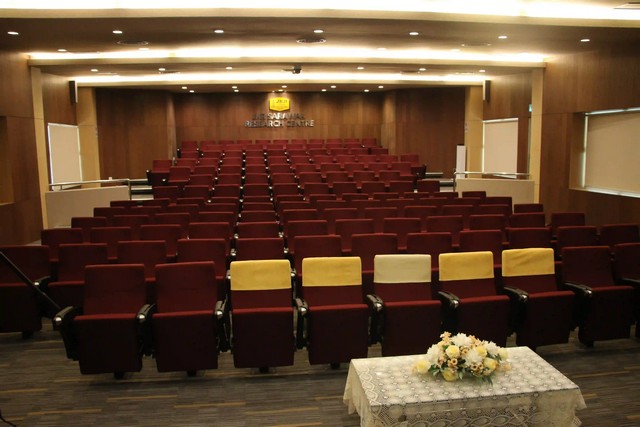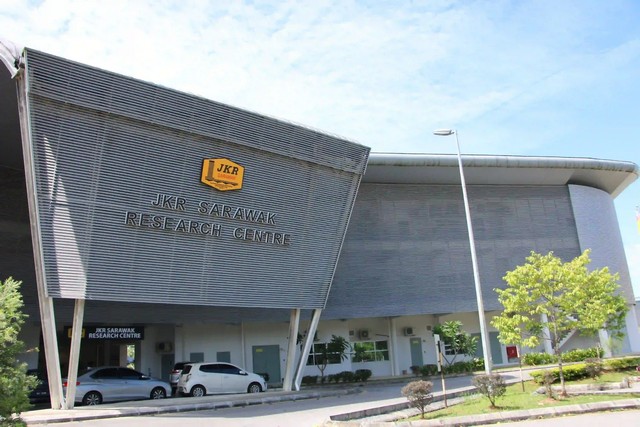Sarawak’s Public Works Department (JKR) has always been at the forefront of the region’s infrastructural development. By establishing the JKR Sarawak Research Centre, formerly known as the Central Materials Laboratory (CML), in 2014, Sarawak is positioning itself as a leader in innovative construction materials and technology. Ir. Chin Hon Sin, Senior Principal Assistant Director at the Central Materials Lab and JKR Research Centre, shared insights into the centre’s journey, mission, and impact on Sarawak’s infrastructure.
A Vision for Progress
The transformation of the CML into the JKR Research Centre was a strategic decision driven by the need to innovate and progress beyond conventional construction methods. The initiative, pitched by the previous director of JKR in 2016, received government approval under the 11th Malaysia Plan with a funding scheme of RM15 million. Construction began in August 2018 and was completed by October 2021, despite the challenges posed by the COVID-19 pandemic.
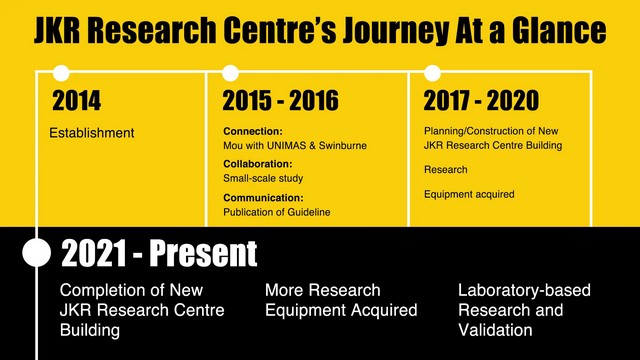
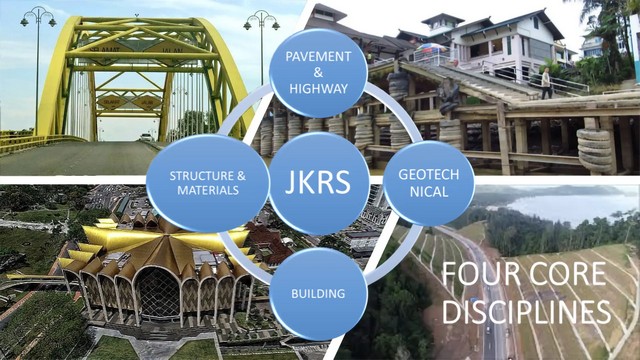
Ir. Chin emphasised the importance of the centre’s mission: “To support the delivery and maintenance of quality infrastructure and building facilities in the most cost-effective and timely manner through research on materials and technology.” This mission is encapsulated in the core themes of the JKR Research Centre: quality, progressiveness, and competency.
Quality, Progressiveness, Competency
The JKR Research Centre operates under three main functions:
- Quality Testing: The Central Materials Laboratory, accredited with ISO 17025, ensures rigorous quality control through advanced testing facilities. This accreditation signifies the centre’s commitment to maintaining high standards and reliability in material testing, which is crucial for ensuring the longevity and safety of infrastructure projects.
- Research: The centre boasts state-of-the-art research facilities, including specialised labs dedicated to pavement, geotechnicals, structures, and concrete materials. These labs are equipped to conduct extensive studies on new materials and construction techniques, enabling innovative solutions that cater to Sarawak’s unique geographical and environmental conditions.
- Training: The JKR Research Centre also focuses on building local competencies through technical training programs. The centre features training rooms and a Building Information Modelling (BIM) laboratory, where industry professionals and students can gain hands-on experience with the latest technologies and methodologies in construction and infrastructure development.
Strategic Themes and Environmental Impact
Each project undertaken by the JKR Research Centre aligns with at least one of five strategic themes:
- Quality: The centre is unwavering in its commitment to elevating infrastructure standards by introducing innovative improvements that enhance the durability and performance of construction projects. One measure is the development of a QC sample tracking and identification system, which ensures meticulous monitoring of material quality throughout the construction process, instilling confidence in the reliability of infrastructure.
- Efficiency: By publishing comprehensive guidelines and best practices, the centre aims to help local construction agencies improve their planning, design, construction, and maintenance processes. This commitment to efficiency ensures that projects are completed on time and within budget, ultimately benefiting the entire community.
- Cost Saving: One of the centre’s primary objectives is implementing cost-effective materials and technologies. By promoting locally sourced materials, the centre helps reduce transportation costs and carbon emissions, making construction projects more affordable and environmentally friendly.
- Sustainability: The JKR Research Centre is committed to advocating for the adoption of environmentally responsible practices in all Sarawakian projects. Hence, their research projects study the viability of using non-toxic materials, minimising waste, and alternative resource-efficient processes, ensuring that infrastructure development in Sarawak has a minimal environmental impact, protecting and preserving our natural environment.
- Green Tech: The centre actively explores advanced technologies that reduce emissions, conserve water, and consume less energy than conventional methods. Solar power, for instance, is gaining popularity in the centre’s studies and innovations for electrical and mechanical applications, demonstrating a commitment to green technology. Notably, the centre’s research on using locally available materials has significantly reduced transportation costs and carbon emissions.
Collaborations and Achievements
The JKR Research Centre collaborates with local academic institutions such as UNIMAS, Swinburne, Curtin, UiTM Sarawak, and Universiti Malaya (UM). These partnerships leverage the research capabilities of local institutions while the centre provides funding, technology, and project opportunities. Such collaborations are pivotal in driving the centre’s research agenda forward, as they bring together diverse expertise and resources to address complex infrastructural challenges.
One of the centre’s proudest achievements is the publication of guidelines tailored to Sarawak’s needs. These include:
- Design Guidelines for Low Volume Rural Road: This guideline addresses the specific needs of rural road construction in Sarawak, considering the region’s varied and often challenging terrain.
- Guideline for the Design of Suspension Footbridge: This document provides comprehensive instructions for the safe and practical design of suspension footbridges, which are crucial for improving connectivity in remote areas.
- Guideline for the Selection and Design of Foundation: This guideline offers detailed criteria for selecting and designing foundations suited to the local soil conditions and structural requirements.
- Guideline for Temporary Electrical Installations: This publication outlines best practices for safely and efficiently installing temporary electrical systems at construction sites.
These publications symbolise Sarawak’s growth towards self-reliance, moving away from referencing guidelines from JKR Malaysia, which often cater to West Malaysia’s context. By developing Sarawak-centric guidelines, the JKR Research Centre ensures that infrastructure projects are tailored to meet Sarawak’s specific needs and conditions, enhancing their effectiveness and sustainability.
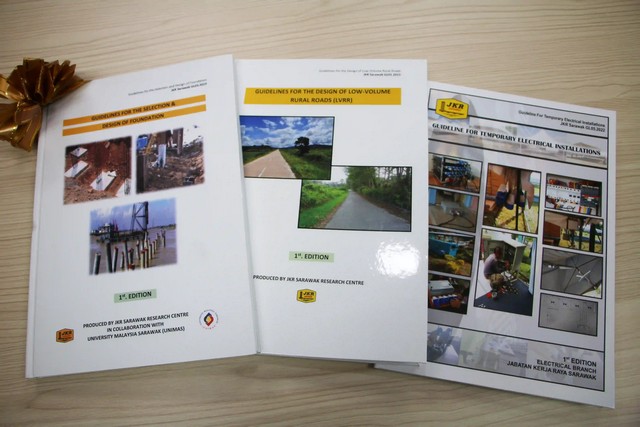
Supporting Local Communities
The JKR Research Centre also plays a vital role in supporting local communities. It hosts seminars with industry players to educate on efficient practices, enforces construction standards, and occasionally provides training to vocational school students. These initiatives help establish an engineering community in Sarawak, promoting learning and exposure to new technologies.
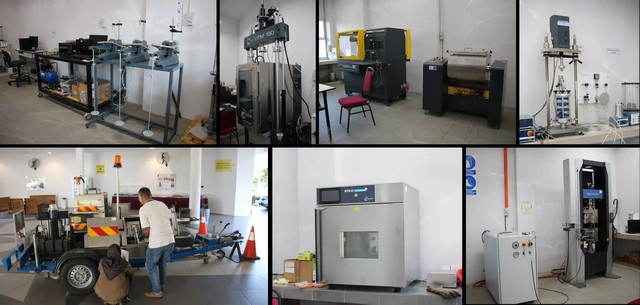
The centre’s commitment to community support extends to enforcing construction standards in development contracts, ensuring that all projects adhere to stringent specifications. The centre’s thorough quality control measures guarantee the quality and safety of infrastructure and foster a culture of excellence within the local construction industry.
Additionally, the centre occasionally accepts study visits from vocational schools, offering basic training and insights into the latest developments in construction technology. While these opportunities are currently limited and depend on the target audience of co-organisers like the Institute of Engineers Malaysia (IEM), they represent an essential step towards nurturing the next generation of engineers and construction professionals in Sarawak.
Aligning with the Post-COVID Development Strategy 2030
The JKR Research Centre’s R&D efforts are closely aligned with the Post-COVID Development Strategy 2030, focusing on several key objectives:
- Reducing construction costs: By minimising the need for material transportation through local resources, the centre helps lower overall project costs, making infrastructure development more affordable.
- Cost saving in asset maintenance: The centre’s research into durable and sustainable materials contributes to longer-lasting infrastructure, reducing the frequency and cost of maintenance.
- Accelerating road connectivity to rural areas: The centre’s innovative solutions and guidelines support the rapid expansion of road networks, enhancing connectivity and accessibility for remote communities in Sarawak.
- Sustainability: The centre promotes sustainable construction practices that reduce waste and conserve resources using recycled plastic and other environmentally friendly materials.
Future Directions
Looking ahead, the JKR Research Centre aims to expand its impact and capabilities in several areas:
- Recycling plastic: The centre plans to conduct more studies on using recycled plastic in construction materials. By repurposing existing plastic waste within Sarawak, the centre can contribute to both environmental sustainability and cost reduction.
- Centre of Engineering Excellence: The centre aspires to establish a Centre of Engineering Excellence within Sarawak and across the region. To achieve this goal, it plans to further enhance research capabilities, facilities, and collaborative partnerships.
- Expanded research and training: The centre aims to increase the number and scope of its research projects and provide more training sessions to develop local skills and competencies. Future plans include engaging with new research partners like the University of Technology Sarawak (UTS).
- Quality control: The centre plans to implement even more thorough quality control testing capabilities, ensuring that all infrastructure projects meet the highest safety and performance standards.
- Larger seminars and training sessions: The centre intends to expand its facilities, including a research and learning resources library, to accommodate larger audiences and provide more comprehensive training.
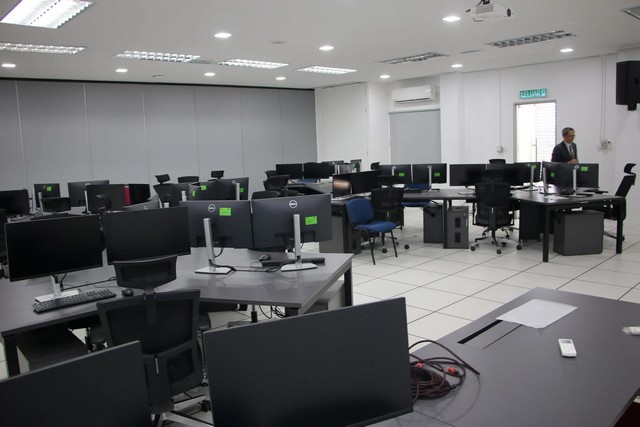
The JKR Sarawak Research Centre is a testament to Sarawak’s commitment to innovation and sustainable development. Through rigorous research, quality control, and strategic collaborations, the centre is revolutionising the local construction industry and setting new standards for regional infrastructure development. As Ir. Chin Hon Sin aptly says, “To be at the forefront in the construction industry, we must be more innovative, progressive, and a learning organisation.”
With its ongoing efforts and plans, the JKR Research Centre is poised to play a crucial role in shaping the future of Sarawak’s infrastructure, ensuring that it meets the highest standards of quality, efficiency, and sustainability.
